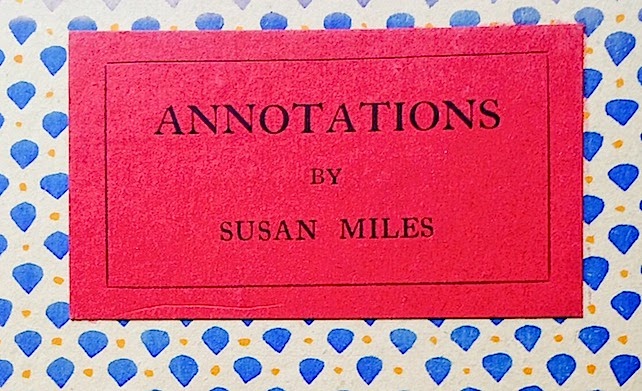 Found - a publisher's flyer loosely inserted in a copy of Kenneth Sylvan Guthrie's Mithraic Mysteries (Platonist Press, Alpine, N.J 1925.) The Platonist Press seems to have flourished between 1900 and 1930 publishing books on philosophy, occult speculation, mysticism and the occasional work of fantasy fiction (including Guthrie's Bleiler listed A Romance Of Two Centuries. A Tale of the Year 2025 which appeared in 1919.) This flyer is eccentric, oddly surreal and now politically slightly dubious. It was probably the work of Guthrie. There is little on the Platonist Press and some of these works may be 'ghosts' (i.e they were never published.) They appear to have moved from Alpine, New Jersey to North Yonkers, NY -which puts this advert some time in the 1920s...
Found - a publisher's flyer loosely inserted in a copy of Kenneth Sylvan Guthrie's Mithraic Mysteries (Platonist Press, Alpine, N.J 1925.) The Platonist Press seems to have flourished between 1900 and 1930 publishing books on philosophy, occult speculation, mysticism and the occasional work of fantasy fiction (including Guthrie's Bleiler listed A Romance Of Two Centuries. A Tale of the Year 2025 which appeared in 1919.) This flyer is eccentric, oddly surreal and now politically slightly dubious. It was probably the work of Guthrie. There is little on the Platonist Press and some of these works may be 'ghosts' (i.e they were never published.) They appear to have moved from Alpine, New Jersey to North Yonkers, NY -which puts this advert some time in the 1920s... SPICY SITUATIONS, and Dr Kenneth Guthrie's REMEDIES
The Board of Education's Examiner had Just turned down the blushing Miss Teacher Candidate. Weeping, she wailed, Is there no hope at all for me? Oh yes; purred he. Try again next year! What could I study in the meanwhile? Dr Guthrie's TEACHERS' PROBLEMS & HOW TO SOLVE THEM, $1.25; 'Value and Limits of the History of Education,' and 'The Mother-Tongue Method of Teaching Modern Languages,' each 30 cents. Will that pass me? Really, Miss, you are too pretty to teach school. Get his Progressive Complete Eduction, or Marriage as the Supreme School of Life, $1.25. And if I pass examination on it? Then I will marry you, Thanks, kind sir!
How a Pessimist Became an Optimist. The theological student had just been preparing a thesis by cribbing the wittiest passages from Discoveries & Insights. Essays Theological, Literary, and of Character-Study, $1. Nettled at the undeserved praise, he blushed at the second-handedness of his religion.











.jpg)







